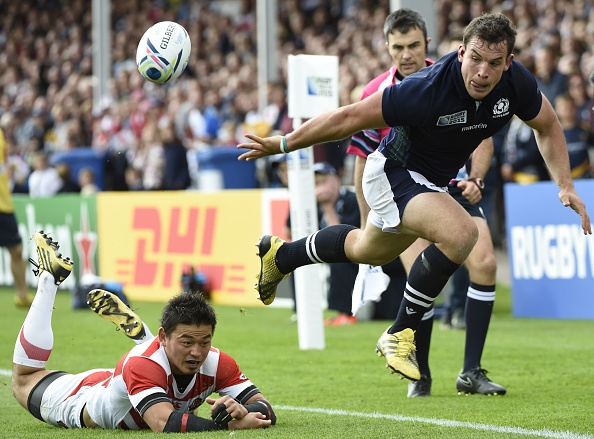Scotland went out of the World Cup in heartbreaking fashion but in the cold light of day what did we take from a tournament that left them with encouraging signs
By Rory Baldwin
Don’t Blame the Referee
Reading the emotive views of fans this week, Scottish fans either feel peripheral to Tier One teams and the victims of endless conspiracies emanating from World Rugby HQ designed to keep the elite teams rolling, whilst south of the equator it seems the Scots are in fact getting all the decisions because they are part of the controlling elite conspiring at World Rugby HQ. It’s all very confusing.
I don’t like to grumble about referees as I believe that the best teams make their own luck – by fair means or foul. Scotland rode their luck a fair bit with Bernard Foley missing most of his conversions, some scrum calls that could have gone the other way, and of course, three fortuitous tries.
I’m a little uneasy that World Rugby have opened up their review to publicly admit Craig Joubert was in the wrong and should have awarded a scrum to Australia instead of the final penalty. Given the ease with which they scored through the phases through the previous 78 minutes, there’s nothing to say the Wallabies wouldn’t have scored again in the remaining two from the set scrum so “we was robbed” is not quite the right attitude to adopt.
It is a shame that Scotland were on the wrong end of several dubious decisions once again (the Ross Ford/Jonny Gray bans, Sean Maitland’s yellow card, Drew Mitchell’s late hit on Stuart Hogg), and it is a minor disgrace that the referee left the pitch without shaking hands with at least either captain.
But it’s also a shame that the pack did not pick a safer lineout call in the rain when all Scotland needed was to retain possession for two more minutes and claim a place in Scottish Rugby history.
Attack Attack Attack
Pete Horne’s stroll through the Australian ruck defence will give (Australian defence coach) Nathan Grey kittens, but is a further example of the sort of heads-up awareness that needs to be a foundation of Scottish play going forward.
Scotland looked so much better on Sunday when they were playing to their strengths and getting the big players carrying the ball, punching holes with a fast-paced offloading game, varying the point of attack and trying to get in behind their opponents. This suits the players and brings territory and possession which in turn cough up kickable penalties and opportunities for quick counter attacking tries. It might leave Scotland teams open to counter-attacks in turn, but that’s better than sitting off and letting heavier opponents batter them about.
This should of course be tempered by the realisation that all of Scotland’s tries against Australia (and at least one against Samoa) were opportunist and they were not as effective at going through the phases to score simple tries as the top teams are.
At least there is a blueprint, and Scotland are increasingly sticking to it.
Still Things to Sort Out
Let’s not get too carried away though.
There are still glaring holes in the Scottish skillset, the two most obvious being dealing with restarts and driving mauls. Vern Cotter will be plotting how to resolve this before Scotland are battered with lineout drives come February.
Without control of the restart, any team can hand back momentum to the opposition instantly after a score, and Scotland have long been guilty of this. Only the TMO spared their blushes on Sunday when an Australian try following a fluffed restart was knocked off for a knock on.
Project Players Don’t Look So Bad Now
Laidlaw’s kicking and game management were generally very good but after him and a resurgent Richie Gray, WP Nel and John Hardie were arguably the two players of the tournament for Scotland. Alongside his Edinburgh mucker Al Dickinson and Ross Ford, Nel bested pretty much every loosehead prop put in front of him and the Scottish scrum was restored to a weapon rather than an embarrassment.
Hardie and Blair Cowan, while never reaching the heights of say Michael Hooper and David Pocock, at least delivered an effective response at the breakdown and in Hardie, Scotland have found a player with a prodigious workrate who will only improve as he settles in at his new club Edinburgh.
This World Cup Was Still A Success
An appearance in the quarter-finals was really the minimum expected of Scotland, but at the same time, for many it was the maximum expected too. No one really gave them a chance against Australia, who were overall favourites in many eyes coming in to the tournament, and remained so – at least until the All Black giant awoke against France on Saturday night.
So to run them closer than England and Wales had, and in fact come two minutes away from knocking them out of the tournament, must be viewed as the best possible outcome short of winning the game.

Exceeding expectations: Gordon Reid and Mark Bennett applaud the fans following their team’s quarter-final defeat. Photo: Getty images
This team now know that they can compete with the very best, which will give them heart for a 2016 Six Nations that should be something of a healing process for Northern Hemisphere rugby.
If they can learn enough from this World Cup to start creating their own luck, Scotland should be competing to win it, not fighting to avoid the Wooden Spoon.








